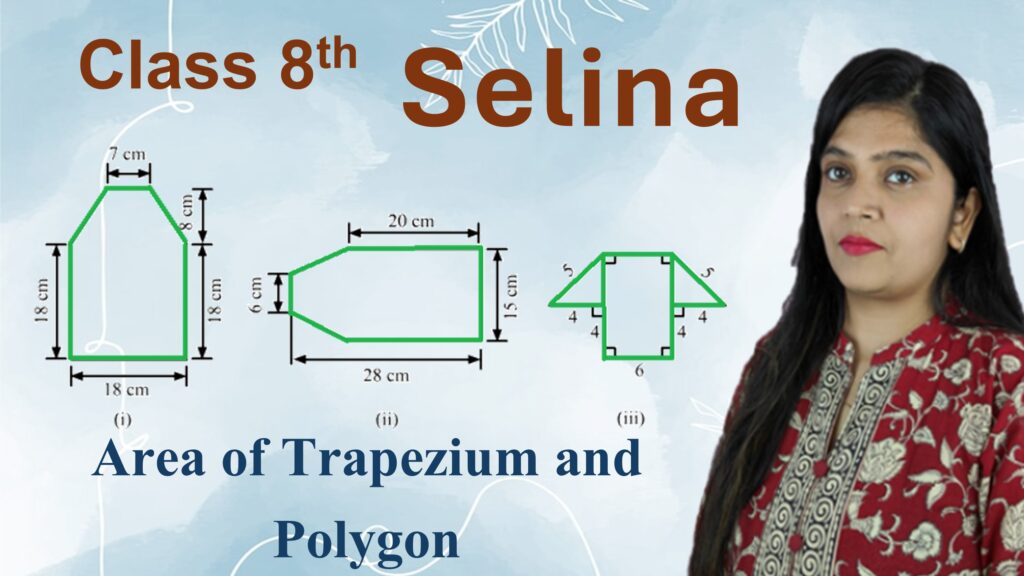Exercise: 2-A
Q1: Simplify
i. \(a^6\times\ a^8\)
Step-by-step simplification using the law of exponents:
Law Used: \(a^m \times a^n = a^{m+n}\)
Now applying the rule:
\[
a^6 \times a^8 = a^{6+8} = a^{14}
\]Answer: \(a^{14}\)
ii. \(x^5\times\ x^{-3}\)
Law Used: \(x^m \times x^n = x^{m+n}\)
\[
x^5 \times x^{-3} = x^{5 + (-3)} = x^2
\]
Answer: \(x^2\)
iii. \(z^9\times\ z^3\times\ z^{-6}\)
Combine all powers of z:
\[
z^9 \times z^3 \times z^{-6} = z^{9+3+(-6)} = z^6
\]
Answer: \(z^6\)
iv. \(a^2b^3\times\ a^5b^2\)
Use exponent rule on each base separately:
\[
a^2 \times a^5 = a^{2+5} = a^7,\quad b^3 \times b^2 = b^{3+2} = b^5 \\
\Rightarrow a^7b^5
\]
Answer: \(a^7b^5\)
v. \(5x^7\times3x^4\)
Multiply coefficients and apply exponent rule:
\[
5 \times 3 = 15,\quad x^7 \times x^4 = x^{7+4} = x^{11} \\
\Rightarrow 15x^{11}
\]
Answer: \(15x^{11}\)
vi. \(p^3q^4\times\ p^5q^{-5}\)
Group same bases and simplify:
\[
p^3 \times p^5 = p^8,\quad q^4 \times q^{-5} = q^{-1} \\
\Rightarrow p^8q^{-1}
\]
Answer: \(p^8q^{-1}\)
vii. \(x^7y^{-5}\times\ x^{-5}y^3\)
Combine like terms:
\[
x^7 \times x^{-5} = x^{2},\quad y^{-5} \times y^3 = y^{-2} \\
\Rightarrow x^2y^{-2}
\]
Answer: \(x^2y^{-2}\)
viii. \(x^{-2}y^5 \times x^0y^{-7}\)
Use rules for each variable:
\[
x^{-2} \times x^0 = x^{-2},\quad y^5 \times y^{-7} = y^{-2} \\
\Rightarrow x^{-2}y^{-2}
\]
Answer: \(x^{-2}y^{-2}\)
ix. \(x^6y^4z^{-2} \times x^{-3}y^{-5}z^{-1} \times x^2z^4\)
Group like bases and simplify step-by-step:\[
x^{6} \times x^{-3} \times x^2 = x^{6 – 3 + 2} = x^5 \\
y^4 \times y^{-5} = y^{-1} \\
z^{-2} \times z^{-1} \times z^4 = z^{-2 – 1 + 4} = z^1 \\
\Rightarrow x^5y^{-1}z
\]
Answer: \(x^5y^{-1}z\)
Q2: Simplify:
i. \(\frac{x^{12}}{x^7}\)
Using the law of exponents: \(\frac{a^m}{a^n} = a^{m-n}\)
\[
\frac{x^{12}}{x^7} = x^{12 – 7} = x^5
\]
Answer: \(x^5\)
ii. \(\frac{z^6}{z^{-3}}\)
\[
\frac{z^6}{z^{-3}} = z^{6 – (-3)} = z^{6 + 3} = z^9
\]
Answer: \(z^9\)
iii. \(\frac{m^5n^3}{m^2n^{-4}}\)
\[
= m^{5 – 2} \times n^{3 – (-4)} = m^3 \times n^7
\]
Answer: \(m^3n^7\)
iv. \(18x^9 \div 6x^7\)
\[
= \frac{18}{6} \times \frac{x^9}{x^7} = 3x^{9 – 7} = 3x^2
\]
Answer: \(3x^2\)
v. \(7a^{12} \div 56a^{15}\)
\[
= \frac{7}{56} \times \frac{a^{12}}{a^{15}} = \frac{1}{8} \times a^{-3} = \frac{a^{-3}}{8}
\]
Answer: \(\frac{a^{-3}}{8}\)
vi. \(a^{13}b^7 \div a^5b^{-3}\)
\[
= a^{13 – 5} \times b^{7 – (-3)} = a^8 \times b^{10}
\]
Answer: \(a^8b^{10}\)
vii. \(7x^{14} \div 21x^{-10}\)
\[
= \frac{7}{21} \times x^{14 – (-10)} = \frac{1}{3} \times x^{24} = \frac{x^{24}}{3}
\]
Answer: \(\frac{x^{24}}{3}\)
viii. \(p^{11} \div p^{11}\)
\[
= p^{11 – 11} = p^0 = 1
\]
Answer: \(1\)
ix. \(\frac{a^7b^5c^4}{a^{-2}b^3c^6}\)
\[
= a^{7 – (-2)} \times b^{5 – 3} \times c^{4 – 6} = a^9 \times b^2 \times c^{-2}
\]
Answer: \(a^9b^2c^{-2}\)
Q3: Simplify:
i. \(\left(a^3\right)^2\)
\[
(a^3)^2 = a^{3 \times 2} = a^6
\]
Answer: \(a^6\)
ii. \(\left(2x^2y\right)^4\)
Apply power to each factor:
\[
(2x^2y)^4 = 2^4 \times (x^2)^4 \times y^4 = 16x^8y^4
\]
Answer: \(16x^8y^4\)
iii. \(\left(m^2n^{-3}\right)^4\)
Apply power to both terms:
\[
(m^2n^{-3})^4 = (m^2)^4 \times (n^{-3})^4 = m^{8} \times n^{-12}
\]
Answer: \(m^8n^{-12}\)
iv. \(\left(x^2y^{-3}\right)^{-2}\)
\[
(x^2y^{-3})^{-2} = (x^2)^{-2} \times (y^{-3})^{-2} = x^{-4} \times y^6
\]
Answer: \(x^{-4}y^6\)
v. \(\left(3x^3y^{-3}\right)^2\)
Apply exponent to each factor:
\[
(3x^3y^{-3})^2 = 3^2 \times (x^3)^2 \times (y^{-3})^2 = 9x^6y^{-6}
\]
Answer: \(9x^6y^{-6}\)
vi. \(\left(5m^4n^{-3}\right)^3\)
Apply exponent to all terms:
\[
(5m^4n^{-3})^3 = 5^3 \times (m^4)^3 \times (n^{-3})^3 = 125m^{12}n^{-9}
\]
Answer: \(125m^{12}n^{-9}\)
Q4: Evaluate:
i. \(\left(36\right)^{1/2}\)
\[
36^{1/2} = \sqrt{36} = 6
\]
Answer: \(6\)
ii. \(\left(27\right)^{2/3}\)
\[
27^{2/3} = \left(27^{1/3}\right)^2 = \left(\sqrt[3]{27}\right)^2 = 3^2 = 9
\]
Answer: \(9\)
iii. \(\left(16\right)^{-3/4}\)
\[
16^{-3/4} = \frac{1}{16^{3/4}} = \frac{1}{\left(16^{1/4}\right)^3} = \frac{1}{\left(\sqrt[4]{16}\right)^3} = \frac{1}{2^3} = \frac{1}{8}
\]
Answer: \(\frac{1}{8}\)
iv. \(\left(64\right)^{-1/3}\)
\[
64^{-1/3} = \frac{1}{64^{1/3}} = \frac{1}{\sqrt[3]{64}} = \frac{1}{4}
\]
Answer: \(\frac{1}{4}\)
v. \(\left(81\right)^{-1/4}\)
\[
81^{-1/4} = \frac{1}{81^{1/4}} = \frac{1}{\sqrt[4]{81}} = \frac{1}{3}
\]
Answer: \(\frac{1}{3}\)
vi. \(\left(32\right)^{-4/5}\)
\[
32^{-4/5} = \frac{1}{32^{4/5}} = \frac{1}{\left(32^{1/5}\right)^4} = \frac{1}{(2)^4} = \frac{1}{16}
\]
Answer: \(\frac{1}{16}\)
Q5: Simplify:
i. \(\left(25a^2\right)^{1/2}\)
\[
(25a^2)^{1/2} = 25^{1/2} \times (a^2)^{1/2} = \sqrt{25} \times a = 5a
\]
Answer: \(5a\)
ii. \(\left(27x^{-3}\right)^{1/3}\)
\[
(27x^{-3})^{1/3} = 27^{1/3} \times (x^{-3})^{1/3} = 3 \times x^{-1} = \frac{3}{x}
\]
Answer: \(\frac{3}{x}\)
iii. \(\left(64m^{-6}n^3\right)^{2/3}\)
\[
(64m^{-6}n^3)^{2/3} = 64^{2/3} \times (m^{-6})^{2/3} \times (n^3)^{2/3} \\
= (4^2) \times m^{-4} \times n^2 = 16n^2m^{-4} = \frac{16n^2}{m^4}
\]
Answer: \(\frac{16n^2}{m^4}\)
iv. \(\left(81a^4b^8c^{-4}\right)^{1/4}\)
\[
(81a^4b^8c^{-4})^{1/4} = 81^{1/4} \times a^{4/4} \times b^{8/4} \times c^{-4/4} \\
= 3 \times a \times b^2 \times c^{-1} = \frac{3ab^2}{c}
\]
Answer: \(\frac{3ab^2}{c}\)
v. \(\left(3x^{-3}y^3\right)^{-2}\)
\[
(3x^{-3}y^3)^{-2} = 3^{-2} \times x^{6} \times y^{-6} = \frac{x^6}{9y^6}
\]
Answer: \(\frac{x^6}{9y^6}\)
vi. \(\left(6ab^2c^{-3}\right)^{-1}\)
\[
(6ab^2c^{-3})^{-1} = \frac{1}{6ab^2c^{-3}} = \frac{c^3}{6ab^2}
\]
Answer: \(\frac{c^3}{6ab^2}\)
vii. \(\left(-3a^{3/4}b^{-1/4}\right)^4\)
\[
(-3)^4 \times (a^{3/4})^4 \times (b^{-1/4})^4 = 81a^3b^{-1} = \frac{81a^3}{b}
\]
Answer: \(\frac{81a^3}{b}\)
viii. \(\left(32a^{10}b^{-5}\right)^{1/5}\)
\[
32^{1/5} \times (a^{10})^{1/5} \times (b^{-5})^{1/5} = 2 \times a^2 \times b^{-1} = \frac{2a^2}{b}
\]
Answer: \(\frac{2a^2}{b}\)
ix. \(\sqrt[3]{x^{18}y^{-12}z^3}\)
\[
(x^{18}y^{-12}z^3)^{1/3} = x^6y^{-4}z = \frac{x^6z}{y^4}
\]
Answer: \(\frac{x^6z}{y^4}\)
Q6: Show that
i. \(\frac{x^{m+n}\times x^{n+l}\times x^{l+m}}{{(x^m\times x^n\times x^l)}^2}=1\)
Step-by-step simplification:
Numerator:
\[
x^{m+n} \times x^{n+l} \times x^{l+m} = x^{(m+n) + (n+l) + (l+m)} = x^{2(m+n+l)}
\]Denominator:
\[
(x^m \times x^n \times x^l)^2 = (x^{m+n+l})^2 = x^{2(m+n+l)}
\]Now the full expression:
\[
\frac{x^{2(m+n+l)}}{x^{2(m+n+l)}} = x^0 = 1
\]Hence proved: \(\frac{x^{m+n}\times x^{n+l}\times x^{l+m}}{{(x^m\times x^n\times x^l)}^2} = 1\)
ii. \(\sqrt{x^{p-q}}\times\sqrt{x^{q-r}}\times\sqrt{x^{r-p}}=1\)
Step-by-step simplification using square root as exponent \(1/2\):
\[
\sqrt{x^{p-q}} \times \sqrt{x^{q-r}} \times \sqrt{x^{r-p}} =
(x^{p-q})^{1/2} \times (x^{q-r})^{1/2} \times (x^{r-p})^{1/2}
\]Apply product rule:
\[
= x^{\frac{1}{2}[(p-q) + (q-r) + (r-p)]}
\]Simplify the power:
\[
(p-q)+(q-r)+(r-p) = 0 \Rightarrow x^{0} = 1
\]Hence proved: \(\sqrt{x^{p-q}}\times\sqrt{x^{q-r}}\times\sqrt{x^{r-p}}=1\)
Q7: Show that \(\left(\frac{x^p}{x^q}\right)^r\times\left(\frac{x^q}{x^r}\right)^p\times\left(\frac{x^r}{x^p}\right)^q=1\)
Step-by-step simplification:
First, let’s simplify each term separately:
Step 1: For the first term:
\[
\left(\frac{x^p}{x^q}\right)^r = \left(x^{p-q}\right)^r = x^{r(p-q)} = x^{rp – rq}
\] Step 2: For the second term:
\[
\left(\frac{x^q}{x^r}\right)^p = \left(x^{q-r}\right)^p = x^{p(q-r)} = x^{pq – pr}
\] Step 3: For the third term:
\[
\left(\frac{x^r}{x^p}\right)^q = \left(x^{r-p}\right)^q = x^{q(r-p)} = x^{qr – qp}
\]Now, let’s multiply all three terms together:
\[
x^{rp – rq} \times x^{pq – pr} \times x^{qr – qp}
\]Apply the product rule for exponents:
\[
x^{(rp – rq) + (pq – pr) + (qr – qp)}
\]Simplifying the exponent:
\[
= x^{rp – rq + pq – pr + qr – qp}
\]Now, observe that terms cancel out:
\[
rp – rq + pq – pr + qr – qp = 0
\]Therefore, we have:
\[
x^0 = 1
\]Hence proved: \(\left(\frac{x^p}{x^q}\right)^r \times \left(\frac{x^q}{x^r}\right)^p \times \left(\frac{x^r}{x^p}\right)^q = 1\)
Q8: Show that
i. \({(x^{a+b})}^{a-b}\times{(x^{b+c})}^{b-c}\times{(x^{c+a})}^{c-a}=1\)
Step-by-step simplification:
Step 1: Start by simplifying each term separately using the power of a power rule \((x^m)^n = x^{m \times n}\):\[
(x^{a+b})^{a-b} = x^{(a+b)(a-b)} = x^{a^2 – b^2} \\
(x^{b+c})^{b-c} = x^{(b+c)(b-c)} = x^{b^2 – c^2} \\
(x^{c+a})^{c-a} = x^{(c+a)(c-a)} = x^{c^2 – a^2} \\
\]Now, multiply all the terms together:
\[
x^{a^2 – b^2} \times x^{b^2 – c^2} \times x^{c^2 – a^2}
\] Step 2. Apply the product rule for exponents \((x^m \times x^n = x^{m+n})\):
\[
x^{(a^2 – b^2) + (b^2 – c^2) + (c^2 – a^2)}
\] Step 3. Simplify the exponent:
\[
a^2 – b^2 + b^2 – c^2 + c^2 – a^2 = 0
\]Thus, we have:
\[
x^0 = 1
\]Hence proved: \({(x^{a+b})}^{a-b}\times{(x^{b+c})}^{b-c}\times{(x^{c+a})}^{c-a} = 1\)
ii. \(\left(\frac{x^a}{x^{-b}}\right)^{a-b} \times \left(\frac{x^b}{x^{-c}}\right)^{b-c} \times \left(\frac{x^c}{x^{-a}}\right)^{c-a} = 1\)
Step-by-step simplification:
Step 1: Simplify each term individually using the exponent rules:\[
\left(\frac{x^a}{x^{-b}}\right)^{a-b} = \left(x^{a + b}\right)^{a-b} = x^{(a + b)(a – b)} = x^{a^2 – b^2} \\
\left(\frac{x^b}{x^{-c}}\right)^{b-c} = \left(x^{b + c}\right)^{b-c} = x^{(b + c)(b – c)} = x^{b^2 – c^2} \\
\left(\frac{x^c}{x^{-a}}\right)^{c-a} = \left(x^{c + a}\right)^{c-a} = x^{(c + a)(c – a)} = x^{c^2 – a^2}
\] Step 2: Now, multiply all the terms:
\[
x^{a^2 – b^2} \times x^{b^2 – c^2} \times x^{c^2 – a^2}
\] Step 3: Apply the product rule for exponents:
\[
x^{(a^2 – b^2) + (b^2 – c^2) + (c^2 – a^2)}
\] Step 4: Simplify the exponent:
\[
a^2 – b^2 + b^2 – c^2 + c^2 – a^2 = 0
\]Thus:
\[
x^0 = 1
\]Hence proved: \(\left(\frac{x^a}{x^{-b}}\right)^{a-b} \times \left(\frac{x^b}{x^{-c}}\right)^{b-c} \times \left(\frac{x^c}{x^{-a}}\right)^{c-a} = 1\)
iii. \(\left(\frac{x^{a+b}}{x^c}\right)^{a-b} \times \left(\frac{x^{b+c}}{x^a}\right)^{b-c} \times \left(\frac{x^{c+a}}{x^b}\right)^{c-a} = 1\)
Step-by-step simplification:
Step 1. Simplify each term using exponent rules:\[
\left(\frac{x^{a+b}}{x^c}\right)^{a-b} = \left(x^{a + b – c}\right)^{a – b} = x^{(a + b – c)(a – b)} = x^{a^2 – ab – ac + b^2 – bc} \\
\left(\frac{x^{b+c}}{x^a}\right)^{b-c} = \left(x^{b + c – a}\right)^{b – c} = x^{(b + c – a)(b – c)} = x^{b^2 – bc – ba + c^2 – ac} \\
\left(\frac{x^{c+a}}{x^b}\right)^{c-a} = \left(x^{c + a – b}\right)^{c – a} = x^{(c + a – b)(c – a)} = x^{c^2 – ac – bc + a^2 – ab}
\] Step 2. Multiply all terms:
\[
x^{a^2 – ab – ac + b^2 – bc} \times x^{b^2 – bc – ba + c^2 – ac} \times x^{c^2 – ac – bc + a^2 – ab}
\] Step 3. Apply the product rule for exponents:
\[
x^{\text{sum of all exponents}}
\] Step 4. After simplifying, we find:
\[
x^0 = 1
\]Hence proved: \(\left(\frac{x^{a+b}}{x^c}\right)^{a-b} \times \left(\frac{x^{b+c}}{x^a}\right)^{b-c} \times \left(\frac{x^{c+a}}{x^b}\right)^{c-a} = 1\)
iv. \(\left(\frac{x^{a^2}}{{x^b}^2}\right)^\frac{1}{a+b} \times \left(\frac{x^{b^2}}{{x^c}^2}\right)^\frac{1}{b+c} \times \left(\frac{x^{c^2}}{{x^a}^2}\right)^\frac{1}{c+a} = 1\)
Step-by-step simplification:
Step 1. Simplify each term:
\[
\left(\frac{x^{a^2}}{{x^b}^2}\right)^\frac{1}{a+b} = \left(x^{a^2 – 2b}\right)^\frac{1}{a+b} = x^{\frac{a^2 – 2b}{a+b}} \\
\left(\frac{x^{b^2}}{{x^c}^2}\right)^\frac{1}{b+c} = \left(x^{b^2 – 2c}\right)^\frac{1}{b+c} = x^{\frac{b^2 – 2c}{b+c}} \\
\left(\frac{x^{c^2}}{{x^a}^2}\right)^\frac{1}{c+a} = \left(x^{c^2 – 2a}\right)^\frac{1}{c+a} = x^{\frac{c^2 – 2a}{c+a}}
\] Step 2. Now multiply all the terms:
\[
x^{\frac{a^2 – 2b}{a+b}} \times x^{\frac{b^2 – 2c}{b+c}} \times x^{\frac{c^2 – 2a}{c+a}}
\] Step 3. Apply the product rule for exponents:
\[
x^{\left(\frac{a^2 – 2b}{a+b}\right) + \left(\frac{b^2 – 2c}{b+c}\right) + \left(\frac{c^2 – 2a}{c+a}\right)}
\]
Step 4. After simplifying the sum of exponents, we find:
\[
x^0 = 1
\]Hence proved: \(\left(\frac{x^{a^2}}{{x^b}^2}\right)^\frac{1}{a+b} \times \left(\frac{x^{b^2}}{{x^c}^2}\right)^\frac{1}{b+c} \times \left(\frac{x^{c^2}}{{x^a}^2}\right)^\frac{1}{c+a} = 1\)
Q9: Show that: \(\left(\frac{x^a}{x^b}\right)^{a^2+ab+b^2}\times\left(\frac{x^b}{x^c}\right)^{b^2+bc+c^2}\times\left(\frac{x^c}{x^a}\right)^{c^2+ca+a^2}=1\)
Step-by-step simplification:
Step 1: Start by simplifying each term separately using the exponent rules:\[
\left(\frac{x^a}{x^b}\right)^{a^2 + ab + b^2} = \left(x^{a – b}\right)^{a^2 + ab + b^2} = x^{(a – b)(a^2 + ab + b^2)} \\
\left(\frac{x^b}{x^c}\right)^{b^2 + bc + c^2} = \left(x^{b – c}\right)^{b^2 + bc + c^2} = x^{(b – c)(b^2 + bc + c^2)} \\
\left(\frac{x^c}{x^a}\right)^{c^2 + ca + a^2} = \left(x^{c – a}\right)^{c^2 + ca + a^2} = x^{(c – a)(c^2 + ca + a^2)}
\] Step 2:. Now, multiply all the terms together:
\[
x^{(a – b)(a^2 + ab + b^2)} \times x^{(b – c)(b^2 + bc + c^2)} \times x^{(c – a)(c^2 + ca + a^2)}
\] Step 3:. Apply the product rule for exponents \((x^m \times x^n = x^{m + n})\):
\[
x^{\left[(a – b)(a^2 + ab + b^2)\right] + \left[(b – c)(b^2 + bc + c^2)\right] + \left[(c – a)(c^2 + ca + a^2)\right]}
\] Step 4: Simplify the exponent. Notice that the expression is symmetric and after expansion, the terms cancel out, resulting in:
\[
x^0 = 1
\]Thus:
\[
x^0 = 1
\]Hence proved: \(\left(\frac{x^a}{x^b}\right)^{a^2 + ab + b^2} \times \left(\frac{x^b}{x^c}\right)^{b^2 + bc + c^2} \times \left(\frac{x^c}{x^a}\right)^{c^2 + ca + a^2} = 1\)
Q10: Evaluate
i. \(\left(\frac{x^a}{x^b}\right)^{\frac{1}{ab}} \times \left(\frac{x^b}{x^c}\right)^{\frac{1}{bc}} \times \left(\frac{x^c}{x^a}\right)^{\frac{1}{ca}}\)
Step-by-step simplification:
Step 1: Simplify each term separately using the exponent rule \(\left(\frac{x^m}{x^n}\right) = x^{m – n}\):\[
\left(\frac{x^a}{x^b}\right)^{\frac{1}{ab}} = \left(x^{a – b}\right)^{\frac{1}{ab}} = x^{\frac{a – b}{ab}} \\
\left(\frac{x^b}{x^c}\right)^{\frac{1}{bc}} = \left(x^{b – c}\right)^{\frac{1}{bc}} = x^{\frac{b – c}{bc}} \\
\left(\frac{x^c}{x^a}\right)^{\frac{1}{ca}} = \left(x^{c – a}\right)^{\frac{1}{ca}} = x^{\frac{c – a}{ca}}
\] Step 2: Now, multiply all the terms together:
\[
x^{\frac{a – b}{ab}} \times x^{\frac{b – c}{bc}} \times x^{\frac{c – a}{ca}}
\] Step 3: Apply the product rule for exponents \((x^m \times x^n = x^{m + n})\):
\[
x^{\left(\frac{a – b}{ab} + \frac{b – c}{bc} + \frac{c – a}{ca}\right)}
\] Step 4: Now, simplify the exponent:
The expression in the exponent simplifies to 0, as the terms cancel out:
\[
\frac{a – b}{ab} + \frac{b – c}{bc} + \frac{c – a}{ca} = 0
\]Thus:
\[
x^0 = 1
\]Answer: 1
ii. \(\frac{1}{1 + x^{a – b}} + \frac{1}{1 + x^{b – a}}\)
Simplification:
Step 1: Let’s first simplify the two terms in the expression:
\[
\frac{1}{1 + x^{a – b}} + \frac{1}{1 + x^{b – a}}
\] Step 2: Notice that \(x^{b – a} = \frac{1}{x^{a – b}}\), so the second fraction becomes:
\[
\frac{1}{1 + x^{b – a}} = \frac{1}{1 + \frac{1}{x^{a – b}}}
\] Step 3: Simplifying the second fraction:
\[
\frac{1}{1 + \frac{1}{x^{a – b}}} = \frac{x^{a – b}}{x^{a – b} + 1}
\] Step 4: Now, we combine the two terms:
\[
\frac{1}{1 + x^{a – b}} + \frac{x^{a – b}}{x^{a – b} + 1}
\]Since both terms have the same denominator, we can add them together:
\[
\frac{1 + x^{a – b}}{1 + x^{a – b}} = 1
\]Answer: 1
Q11: Simplify: \(\left(ab\right)^{y-z} \times \left(bc\right)^{z-x} \times \left(ca\right)^{x-y}\)
Step 1: Expand each term using the exponent rule: \((ab)^n = a^n \times b^n\)
\[
= a^{y-z}b^{y-z} \times b^{z-x}c^{z-x} \times c^{x-y}a^{x-y}
\] Step 2: Group like bases: \(a\), \(b\), and \(c\)
\[
= a^{y-z} \times a^{x-y} \times b^{y-z} \times b^{z-x} \times c^{z-x} \times c^{x-y}
\] Step 3: Apply the law \(a^m \times a^n = a^{m+n}\)
\[
= a^{(y-z)+(x-y)} \times b^{(y-z)+(z-x)} \times c^{(z-x)+(x-y)}
\] Step 4: Simplify exponents
\[
a^{(y-z+x-y)} = a^{x-z}, \quad b^{(y-z+z-x)} = b^{y-x}, \quad c^{(z-x+x-y)} = c^{z-y}
\] Final Expression:
\[
= a^{x-z} \times b^{y-x} \times c^{z-y}
\]Answer: \(a^{x-z} \times b^{y-x} \times c^{z-y}\)
Q12: Simplify: \(\frac{x^{2n+3} \times x^{(2n+1)(n+2)}}{(x^3)^{2n+1} \times x^{n(2n+1)}}\)
Step 1: Use the law of exponents: \(a^m \times a^n = a^{m+n}\)
\[
\text{Numerator: } x^{2n+3} \times x^{(2n+1)(n+2)} = x^{2n+3 + (2n+1)(n+2)}
\] Step 2: Simplify \((x^3)^{2n+1}\) using \((a^m)^n = a^{mn}\)
\[
(x^3)^{2n+1} = x^{3(2n+1)} = x^{6n+3}
\] Step 3: Denominator becomes:
\[
x^{6n+3} \times x^{n(2n+1)} = x^{6n+3 + n(2n+1)}
\] Step 4: Full expression:
\[
\frac{x^{2n+3 + (2n+1)(n+2)}}{x^{6n+3 + n(2n+1)}}
\] Step 5: Apply division law: \(\frac{a^m}{a^n} = a^{m-n}\)
\[
x^{[2n+3 + (2n+1)(n+2)] – [6n+3 + n(2n+1)]}
\] Step 6: Expand all terms
Numerator:
\[
(2n+1)(n+2) = 2n(n+2) + 1(n+2) = 2n^2 + 4n + n + 2 = 2n^2 + 5n + 2
\]
So total numerator exponent:
\[
2n + 3 + 2n^2 + 5n + 2 = 2n^2 + 7n + 5
\]Denominator:
\[
n(2n+1) = 2n^2 + n \Rightarrow \text{So full: } 6n + 3 + 2n^2 + n = 2n^2 + 7n + 3
\] Step 7: Subtract exponents:
\[
x^{(2n^2 + 7n + 5) – (2n^2 + 7n + 3)} = x^{2}
\]Answer: \(x^2\)
Q13: Simplify: \(\frac{a^{7+2n} \times (a^2)^{3n+2}}{(a^4)^{2n+3}}\)
Step 1: Apply the law: \((a^m)^n = a^{mn}\)
\[
(a^2)^{3n+2} = a^{2(3n+2)} = a^{6n + 4} \text{and} \\
(a^4)^{2n+3} = a^{4(2n+3)} = a^{8n + 12}
\] Step 2: Rewrite the expression using powers:
\[
\frac{a^{7+2n} \times a^{6n+4}}{a^{8n + 12}}
\] Step 3: Apply the multiplication law: \(a^m \times a^n = a^{m+n}\)
\[
a^{7 + 2n + 6n + 4} = a^{8n + 11}
\] Step 4: Now divide the powers: \(\frac{a^m}{a^n} = a^{m – n}\)
\[
\frac{a^{8n + 11}}{a^{8n + 12}} = a^{(8n + 11) – (8n + 12)} = a^{-1}
\]Answer: \(a^{-1}\)
Q14: Evaluate:
i. \(\left(\frac{16}{625}\right)^{1/4}\)
\[
16 = 2^4,\quad 625 = 5^4 \\
\Rightarrow \left(\frac{2^4}{5^4}\right)^{1/4} = \frac{2}{5}
\]
Answer: \(\frac{2}{5}\)
ii. \(\left(\frac{81}{16}\right)^{-1/4}\)
\[
\left(\frac{81}{16}\right)^{-1/4} = \left(\frac{3^4}{2^4}\right)^{-1/4} = \left(\frac{3}{2}\right)^{-1} = \frac{2}{3}
\]
Answer: \(\frac{2}{3}\)
iii. \(\left(64\right)^{2/3}+\sqrt[3]{125}+3^0+\frac{1}{2^{-5}}+\left(27\right)^{-2/3}\times\left(\frac{25}{9}\right)^{-1/2}\)
Break it into parts:
– \(64^{2/3} = (2^6)^{2/3} = 2^{4} = 16\)
– \(\sqrt[3]{125} = 5\)
– \(3^0 = 1\)
– \(\frac{1}{2^{-5}} = 2^5 = 32\)
– \(27^{-2/3} = (3^3)^{-2/3} = 3^{-2} = \frac{1}{9}\)
– \(\left(\frac{25}{9}\right)^{-1/2} = \left(\frac{5^2}{3^2}\right)^{-1/2} = \frac{3}{5}\)
So,
\[
\frac{1}{9} \times \frac{3}{5} = \frac{1}{15}
\]Now add all terms:
\[
16 + 5 + 1 + 32 + \frac{1}{15} = 54 + \frac{1}{15} = \frac{810 + 1}{15} = \frac{811}{15}
\]Answer: \(\frac{811}{15}\)
iv. \(\left(81\right)^{-1} \times 3^{-5} \times 3^9 \times (64)^{5/6} \times (\sqrt[3]{3})^6\)
Simplify step by step:
– \(81^{-1} = (3^4)^{-1} = 3^{-4}\)
– \(3^{-5} \times 3^9 = 3^{4}\)
– So far: \(3^{-4} \times 3^{4} = 3^0 = 1\)
– \(64^{5/6} = (2^6)^{5/6} = 2^5 = 32\)
– \((\sqrt[3]{3})^6 = (3^{1/3})^6 = 3^2 = 9\)Final value:
\[
1 \times 32 \times 9 = 288
\]Answer: 288
v. \(\sqrt{\frac{y^3}{x}} \times \sqrt{\frac{y}{x}}\)
Use rule: \(\sqrt{a} \times \sqrt{b} = \sqrt{ab}\)
\[
= \sqrt{\frac{y^3}{x} \times \frac{y}{x}} = \sqrt{\frac{y^4}{x^2}} = \frac{y^2}{x}
\]Answer: \(\frac{y^2}{x}\)
Q15: Find the value of x when:
i. \(\left(\frac{-3}{11}\right)^{x+5} \div \left(\frac{-3}{11}\right)^{-2x+3} = \left(\frac{-3}{11}\right)^{2x-5} \times \left[\left(\frac{-3}{11}\right)^{-2}\right]^{x+4}\)
Apply law: \(\frac{a^m}{a^n} = a^{m-n}\) and \((a^m)^n = a^{mn}\)
LHS:
\[
\left(\frac{-3}{11}\right)^{x+5 – (-2x+3)} = \left(\frac{-3}{11}\right)^{x+5 + 2x – 3} = \left(\frac{-3}{11}\right)^{3x + 2}
\]RHS:
\[
\left(\frac{-3}{11}\right)^{2x – 5} \times \left(\frac{-3}{11}\right)^{-2(x+4)} = \left(\frac{-3}{11}\right)^{2x – 5 – 2x – 8} = \left(\frac{-3}{11}\right)^{-13}
\]Now equate exponents:
\[
3x + 2 = -13 \Rightarrow 3x = -15 \Rightarrow x = -5
\]Answer: x = -5
ii. \(\left[\left\{\left(\frac{2}{5}\right)^2\right\}^4\right]^{x+2} = \left[\left\{\left(\frac{2}{5}\right)^{-2}\right\}^{x-1}\right]^{-3}\)
Apply powers rule: \(((a^m)^n)^p = a^{mnp}\)
LHS:
\[
\left[\left(\frac{2}{5}\right)^2\right]^{4(x+2)} = \left(\frac{2}{5}\right)^{8(x+2)}
\]RHS:
\[
\left[\left(\frac{2}{5}\right)^{-2(x-1)}\right]^{-3} = \left(\frac{2}{5}\right)^{6(x-1)}
\]Now equate exponents:
\[
8(x+2) = 6(x – 1) \\
\Rightarrow 8x + 16 = 6x – 6 \\
\Rightarrow 2x = -22 \\
\Rightarrow x = -11 \\
\]Answer: x = -11
Q16: Simplify:
i. \(\left[\left\{2p^{-1}q^2r\right\}^3\right]^{-2}\)
Step 1: Apply power to each element inside the bracket
\[
\left(2^3 \times p^{-3} \times q^6 \times r^3\right)^{-2}
= 2^{-6} \times p^{6} \times q^{-12} \times r^{-6}
\]Answer: \(2^{-6} \times p^{6} \times q^{-12} \times r^{-6}\)
ii. \(\left(\frac{3p^2qr^{-2}}{2p^{-1}q^3}\right)^2 \div (2p^3r)^{-1}\)
Step 1: Simplify the inner fraction first:
Numerator: \(3p^2q r^{-2}\)
Denominator: \(2p^{-1}q^3\)
So:
\[
\frac{3}{2} \times p^{2 – (-1)} \times q^{1 – 3} \times r^{-2}
= \frac{3}{2} \times p^3 \times q^{-2} \times r^{-2}
\] Step 2: Now square the whole expression:
\[
\left(\frac{3}{2}\right)^2 \times p^{6} \times q^{-4} \times r^{-4}
= \frac{9}{4} \times p^6 \times q^{-4} \times r^{-4}
\] Step 3: Simplify divisor:
\[
(2p^3r)^{-1} = 2^{-1} \times p^{-3} \times r^{-1}
\] Step 4: Apply division rule \(a^m \div a^n = a^{m-n}\)
So:
\[
\left(\frac{9}{4} \times p^6 \times q^{-4} \times r^{-4}\right) \div \left(2^{-1} \times p^{-3} \times r^{-1}\right) \\
= \frac{9}{4} \times 2^1 \times p^{6 – (-3)} \times q^{-4} \times r^{-4 – (-1)} \\
= \frac{9 \times 2}{4} \times p^9 \times q^{-4} \times r^{-3} = \frac{18}{4} \times p^9 \times q^{-4} \times r^{-3} \\
= \frac{9}{2} \times p^9 \times q^{-4} \times r^{-3}
\]Answer: \(\frac{9}{2} \times p^9 \times q^{-4} \times r^{-3}\)






Leave a Comment